Last Updated on: 2nd May 2024, 06:30 am
Chefchaouen, the “blue pearl of Morocco,” is a small town in northwest Morocco, in the Rif Mountains. It’s known for its charming blue-washed buildings.
The name Chefchaouen means ‘Look at the horns”- a reference to the twin mountain peaks that tower over this hillside town. The locals call it Chaouen, but for most travellers to Morocco, it’s simply known as “The Blue City.”
Despite Chefchaouen being a popular tourist town, the town still retains a laid-back authenticity. Or maybe it just felt that way because I was visiting there in the middle of February in the low season. But the experience was certainly more relaxed than what you’ll likely experience in Marrakech or Fes.
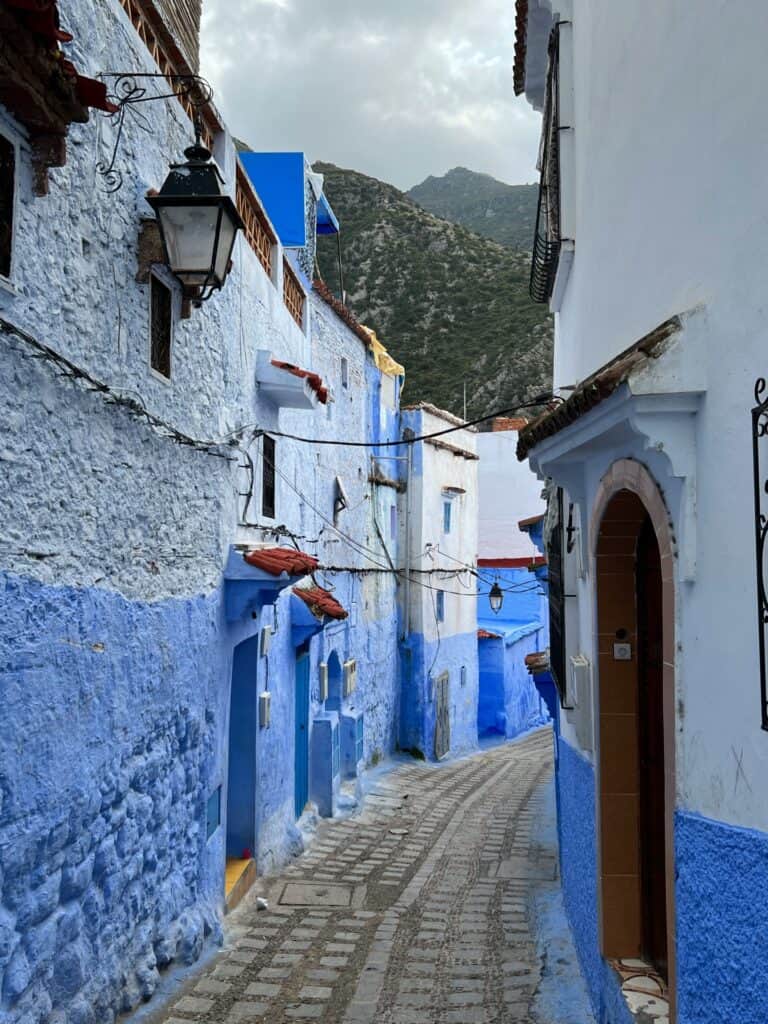
A Little History
In 1471, Moulay Ali Ben Moussa founded the town of Chefchaouen. The town began as a small fortress to fight off the Portuguese invasions of Morocco. The Ghomara tribes, Moriscos, and Jewish immigrants settled there after the 1492 Spanish Reconquista.
Centuries later, in 1920, Spain took control of Chefchaouen, and the town became part of Spanish Morocco until 1956, when Morocco gained independence.
How To Spend One Day In Chefchaouen
Roam The Streets Of The Blue City
Set off early to roam the streets, and you have the place to yourself before the day trippers arrive.
Chefchaouen is so much quieter and calmer in the mornings than other Moroccan cities, so you can happily spend hours calmly exploring the blue alleys and taking photos of cute porches, doorways and cats in the sun. The blue houses of this city are easily the top thing to see in Chefchaouen!
But do bear in mind when exploring Chefchaouen that people still live in this picture postcard town. So be respectful when taking pictures of homes or posing for Instagram.
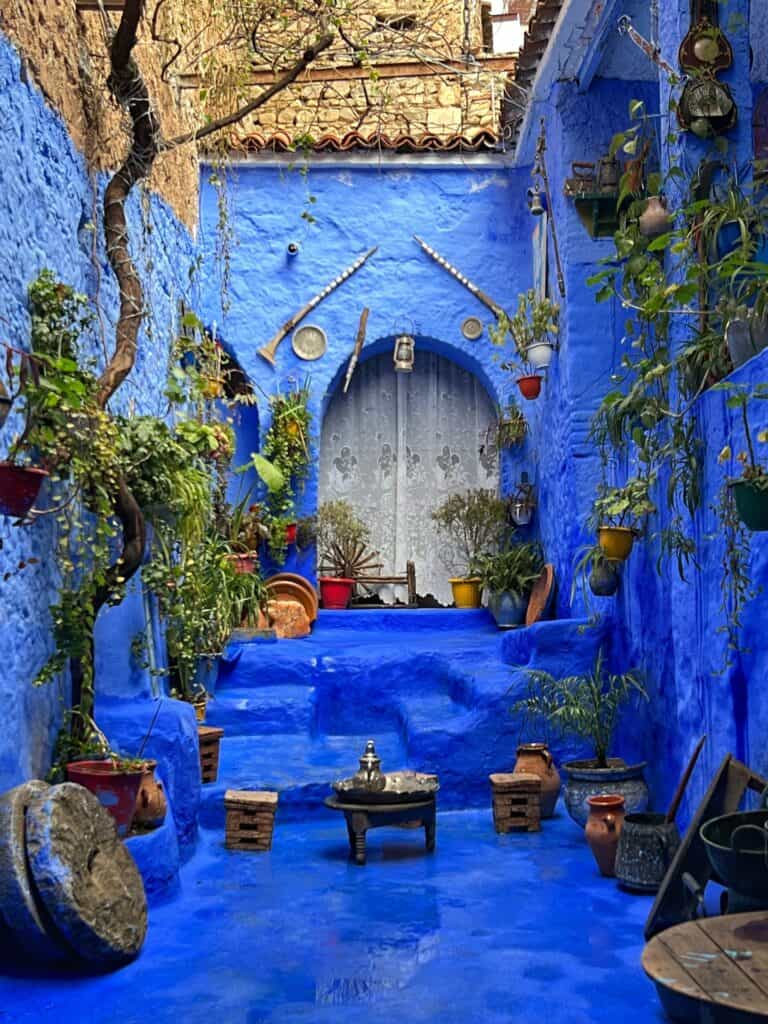
Talking of Instagram, you know that photo you always see online? Yes, this one. You have to pay five Dirhams to take this photo, about 50 cents. It’s not much I know, but the setting is not real, Chefchaouen. To find the spot, however, just look for the queue of Instagrammers on the main stretch.
The Kasbah Museum
In the shady main square of Place Outa el Hammam is the 15th-century red-walled Kasbah, a fortress and dungeon, and now the Chefchaouen Ethnographic Museum.
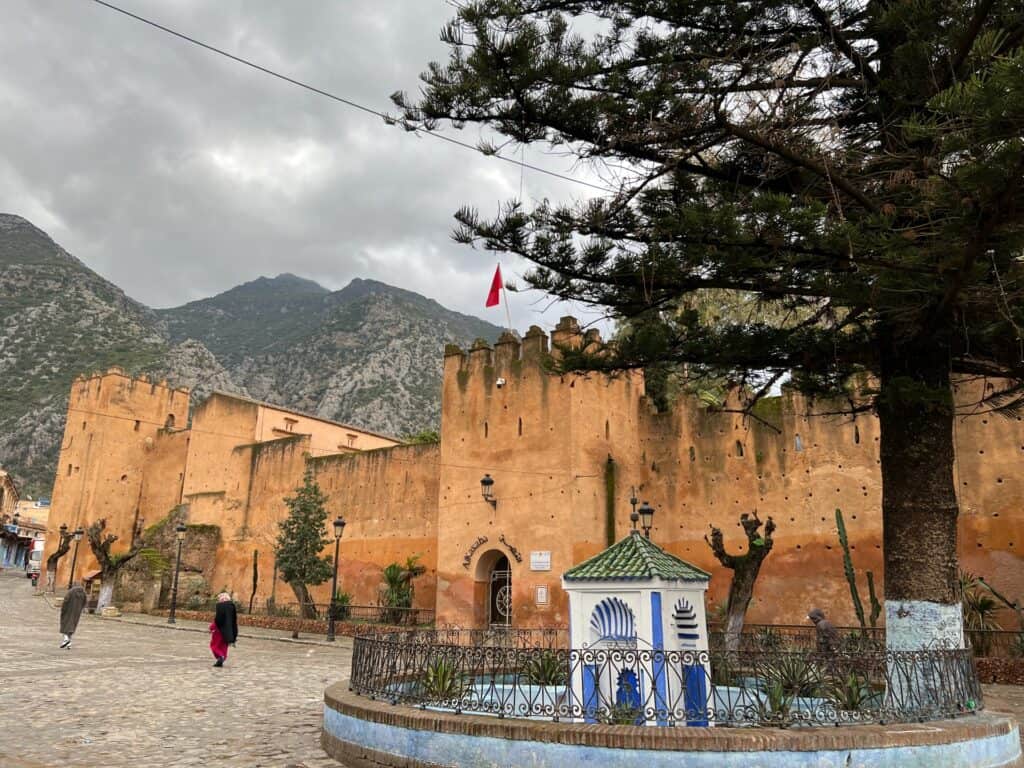
Inside the Kasbah, you can climb the fort tower for beautiful views over the city.
It costs 60 Moroccan dirhams to enter the Kasbah, which is about $6. Note none of the descriptions in the tower are in English.
Shopping In The Medina
Go shopping in the narrow, blue, winding streets of the medina. The souks may not be as big as Marrakech or Fes, but it’s certainly a lot less hassle, and there is less chance of getting hopelessly lost, although that’s part of the fun. Also note there are many native handicrafts in Chefchaouen that are not available elsewhere in Morocco, such as wool garments and woven blankets.
Also, don’t forget to visit the leather and weaving workshops that line the steep cobbled streets.
Tip: Throughout Morocco, bargaining is common practice. Always haggle for a price, and never accept the first offer.
Ras El Maa Waterfall
On the way to the Spanish mosque, you’ll find the small Ras El Maa waterfall, located just outside the medina. It’s not the most impressive waterfall you’ll ever see, but it’s a pleasant spot to relax, enjoy a mint tea, and watch the locals washing their clothes.
Visit The Spanish Mosque
Overlooking the town of Chefchaouen is the Spanish Mosque. Built during the 1920s, the mosque was never used and sits abandoned on a hill to this day. But it’s an easy 30-minute hike to the top, where you will be rewarded with great views over the town. It’s a popular spot to visit during sunset.
Why Is Chefchaouen Blue?
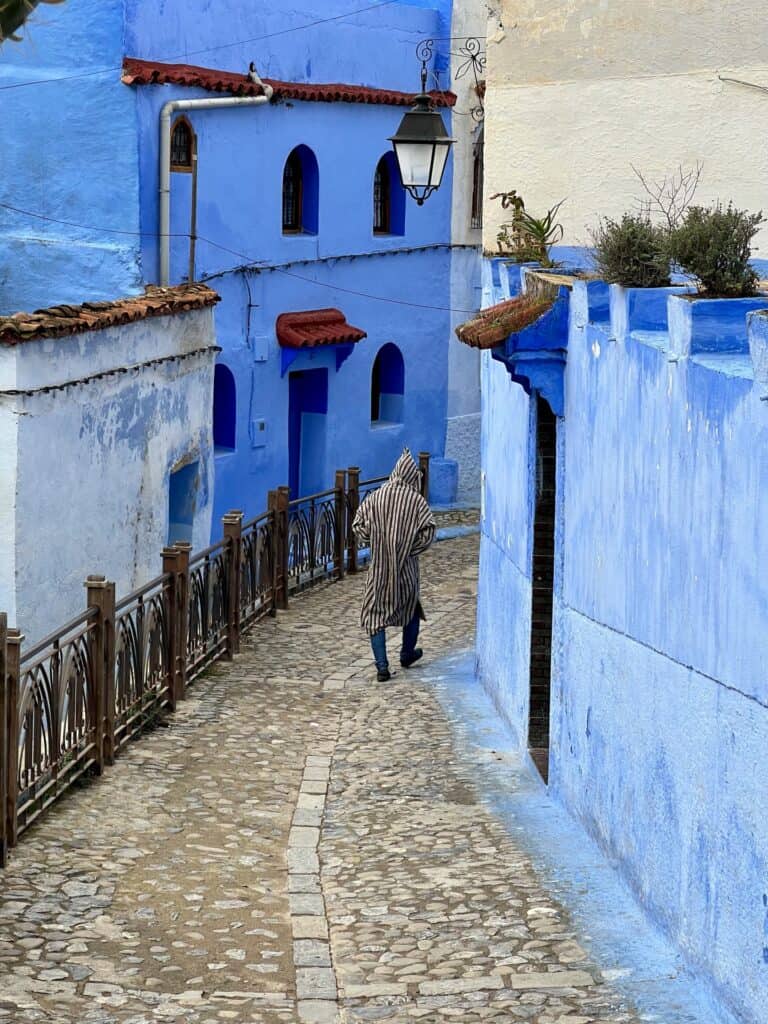
There are so many different answers to this question; it depends really on who you ask.
Many say the Jewish immigrants introduced the blue colour to Chefchaouen. But older residents of the town say that it was only the Jewish part of the medina that used to be painted blue, and the rest of the town was white.
Some say that the blue shades keep the mosquitoes away. Others say the blue colour keeps the homes cool during the hot summer months.
Or maybe it’s because the colour blue represents happiness and optimism in Islamic culture.
But more are saying it’s painted blue these days to attract tourists.
Whatever the real reason, Morocco’s blue city should be on your list of places to visit.
Spanish Is More Useful Than French In Chefchaouen
Both France and Spain controlled Morocco during the early 1900s. And even though Morocco gained its independence in 1956, French is still widely spoken by Moroccans throughout much of the country.
However, Spain was the protectorate in north Morocco, so expect to hear more Spanish than French in Chefchaouen, but don’t panic, plenty of people in Chefchaouen speak English.
Is It Safe For Solo Travellers?
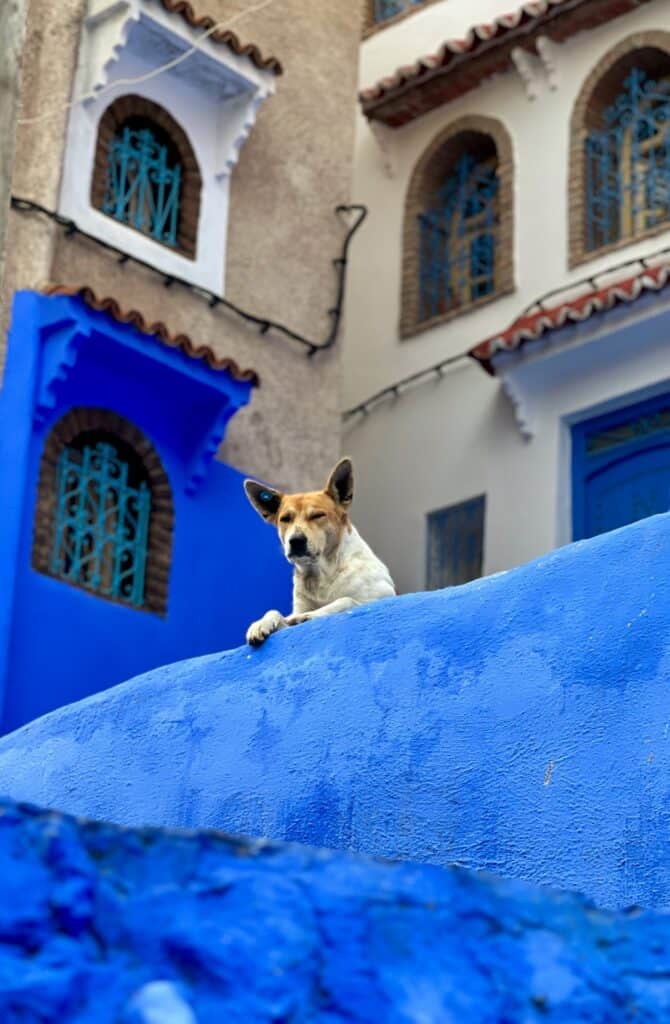
Although admittedly, for this part of my travels around Morocco, I was travelling with a group, I did wander off on my own. I felt very safe exploring Chefchaouen on my own, wandering the different alleyways, and taking photos. Even strolling through the markets, there was no hassle when browsing the shops, even though I wouldn’t be buying anything.
I was offered hashish in the main square near the Kasbah, but as a large percentage of the world’s hashish is grown in the Rif Mountains, it’s often just a farmer selling his ware. And the sellers weren’t persistent or aggressive.
However, if you’re more interested in joining a group tour of Morocco, I highly recommend this two-week trip I took and paid for with Nomadic Tours.
Is One Day In Chefchaouen Enough?
The disadvantage of travelling with a group meant we had just one day in Chefchaouen before moving on. I could happily have stayed for a few more days.
Chefchaouen is small, so yes, you can easily see everything in one day. However, if you want to relax in one of the hammams or enjoy a hike in the nearby mountains, you may want to consider allowing yourself a few extra days.
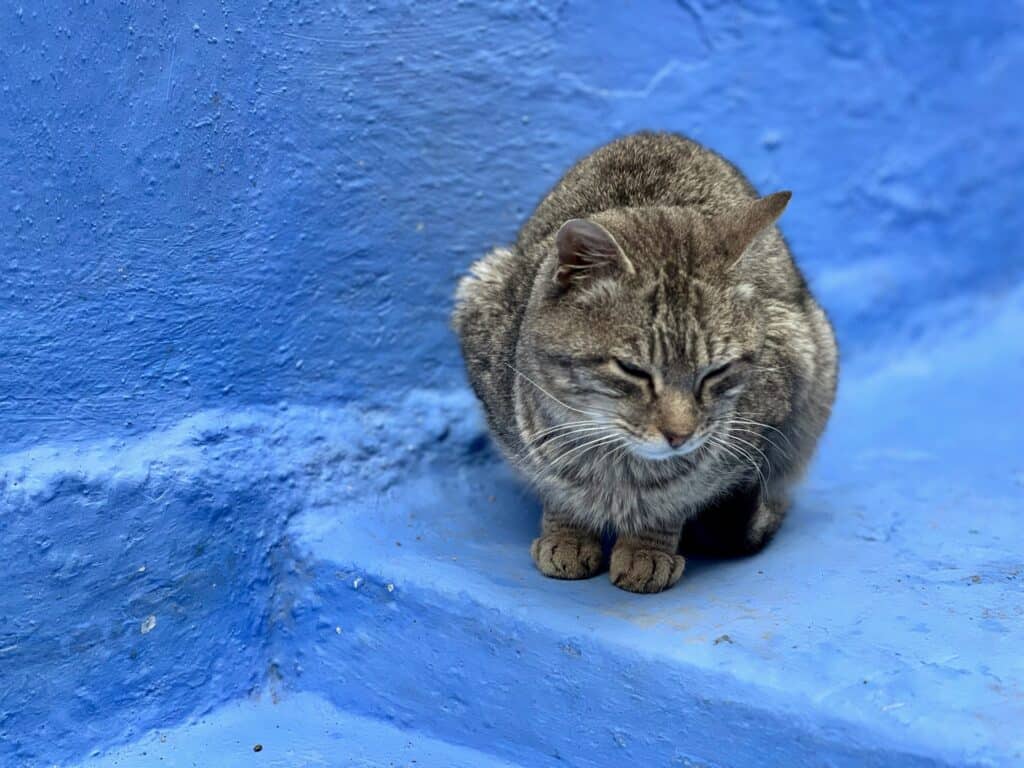
Recommended Restaurants
For a touristy town, many restaurants in Chefchaouen get good ratings on Trip Advisor. I enjoyed a lovely meal at the Lalla Messaouda Restaurant.
Note that many restaurants don’t have wine on the menu but are happy to go out and get you a bottle, but that does come with a hefty cover charge!
How To Get To Chefchaouen
There’s no train service to Chefchaouen, but it is a scenic drive from Fes or Tangier. Expect a four-hour ride from Fes and a little over two hours from Tangier.
The roads were very good in Morocco, so you might even want to consider renting a car for your time in the country, but finding parking near the medina will be a nightmare.
For convenience and if time is short, there are day trips available from Fes and Tangiers, such as these:
Day trip to Chefchaouen from Fes.
Day trip to Chefchaouen from Tangier.
Or book yourself a private transfer and make a few stops on the way to Chefchaouen.
Where To Stay In Chefchaouen
Want to stay longer, then check out these accommodation deals.
For luxury, try the Lina Ryad & Spa, which is located right in the heart of the medina and has a rooftop bar.
For a mid-range/ budget hotel, I stayed at the Madrid Hotel. It’s just outside the medina but quite quirky and charming. Although bear in mind this hotel is where many small group travel adventure groups stay.
For more accommodation ideas in Chefchaouen, check these out.
For More Posts On Africa, Check These Out
Best Things To Do In Rabat Morocco
A Day Trip To Victoria Falls From Botswana
Best National Parks In Botswana
Visit Atlas Studios – The Hollywood of Morocco
Amazing Pictures of the Temple of Kom Ombo, Egypt
Temple of Isis at Philae, Egypt
Over 50 Travel in Egypt With On the Go Tours
Save This Post For Later
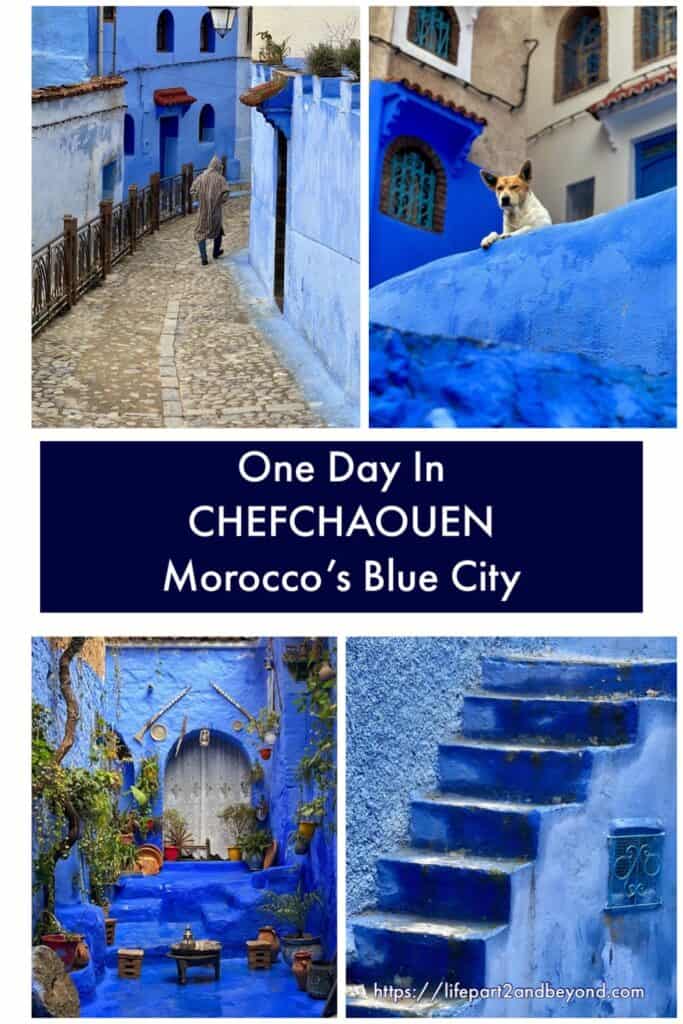
Disclaimer: Some of the links on this website are “affiliate links”, meaning that if you click on the link and make a purchase, I will receive a small commission at no extra cost. This helps me to keep my website running and continue to share my travelling knowledge with you. I thank you for using the links on my website.
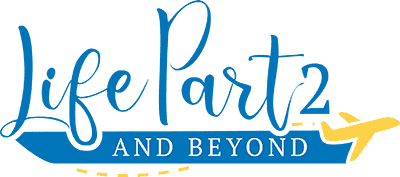




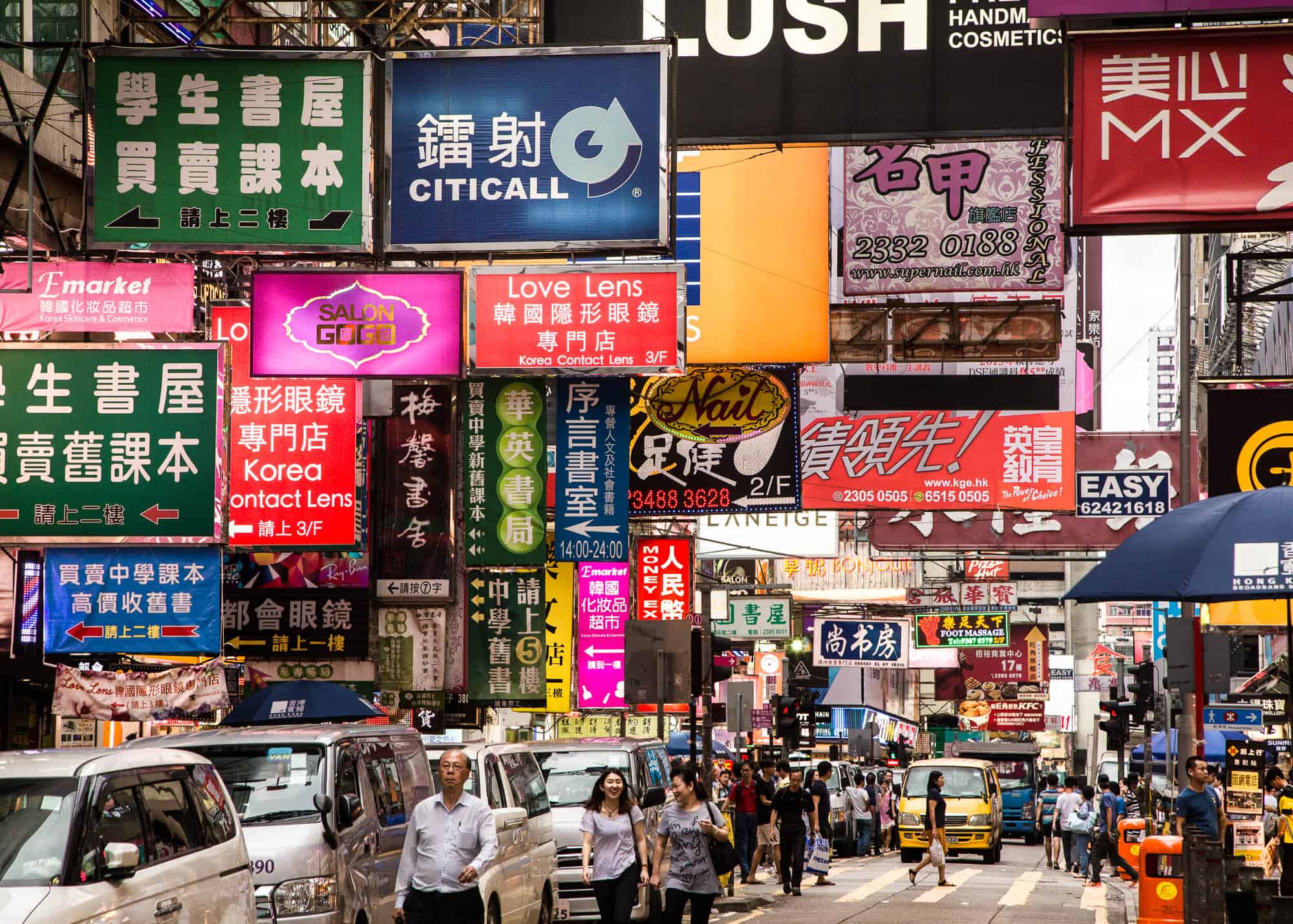
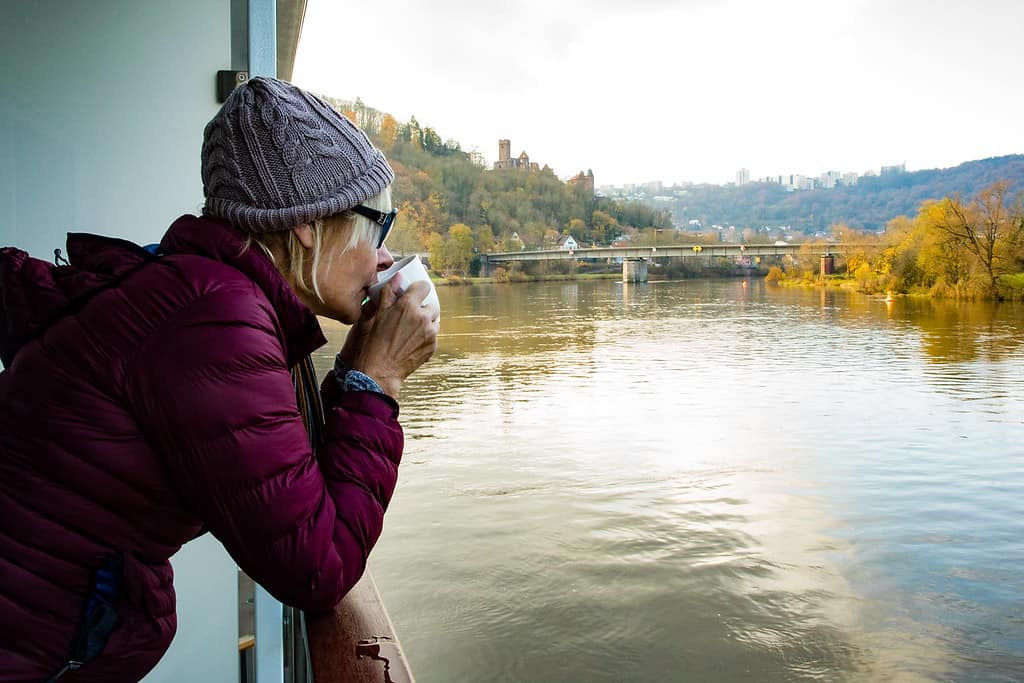
Great info, love the photos!
So beautiful! I’m saving this to my travel inspo list 🙂
Morocco is definitely on our travel wish list. And I now know I need to plan to visit Chefchaouen. We would be intrigued by the beautiful blue buildings. Fun to read about different versions about the colour blue. I would go with it representing happiness and optimism.
A great introduction to Chefchaouen and interesting insights as to the many blue hues.
“Salam from Morocco! Chefchaouen, the Blue Pearl of the Rif, holds a special place in our hearts. The hues of blue paint a vivid canvas, reflecting the tranquility and authenticity of our culture. Every alley whispers tales of history, and every sip of mint tea resonates with the warmth of Moroccan hospitality. Chefchaouen is more than a city; it’s a symphony of colors, flavors, and traditions that dance in harmony. Shukran for capturing its essence so beautifully
Amazing blog and very interesting
Thank you, glad you enjoyed it 🙂 One of my favourite places in Morocco.